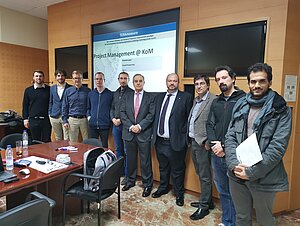January 17, 2020

© Universidad Carlos III de Madrid
The Fraunhofer Heinrich Hertz Institute HHI participates in the EU-funded FET-Open project TERAmeasure. The project partners met in November 2019 for an official kick-off meeting at the Universidad Carlos III de Madrid (UC3M) where they set off their research activities leading to an universal, broadband and contact-free measurement and sensing platform for the millimeter wave (mmW) and Terahertz (THz) frequency range. A photonic approach is used to develop a new class of Vector Network Analyzers (VNAs) for a non-contact device characterization covering broad mmW and THz frequency ranges. This project will unlock the potential for a vast variety of applications for non-contact, broadband, and phase-sensitive measurements.
This breakthrough will be achieved exploiting photonic integration technology and silicon micromachining to realize a broadband continuous-wave THz platform equipped with refractive index engineered dielectric waveguides. TERAmeasure aims at replacing costly frequency-extension modules, relying on rectangular waveguide flanges, by a photonic approach that covers the full spectrum from 30 GHz up to 3 THz. Thereby, TERAmeasure helps to unify the mmW and THz spectrum to a single device, where currently more than 10 separate devices are required.
Within TERAmeasure, two different research groups from Fraunhofer HHI’s Photonic Components Department, the Terahertz Sensors and Systems Group and the Hybrid PICs Group, will develop mmW/THz transceivers based on waveguide integrated optoelectronic components as well as photonic integrated circuits (PICs) based on the PolyBoard hybrid integration technology for the generation of the optical signals.
Besides Fraunhofer HHI (Berlin, Germany), the project consortium consists of the Universidad Carlos III de Madrid (Madrid, Spain; Coordinator), KTH Royal Institute of Technology (Stockholm, Sweden), Anritsu EMEA Ltd. (Luton, United Kingdom), and Protemics GmbH (Aachen, Germany).